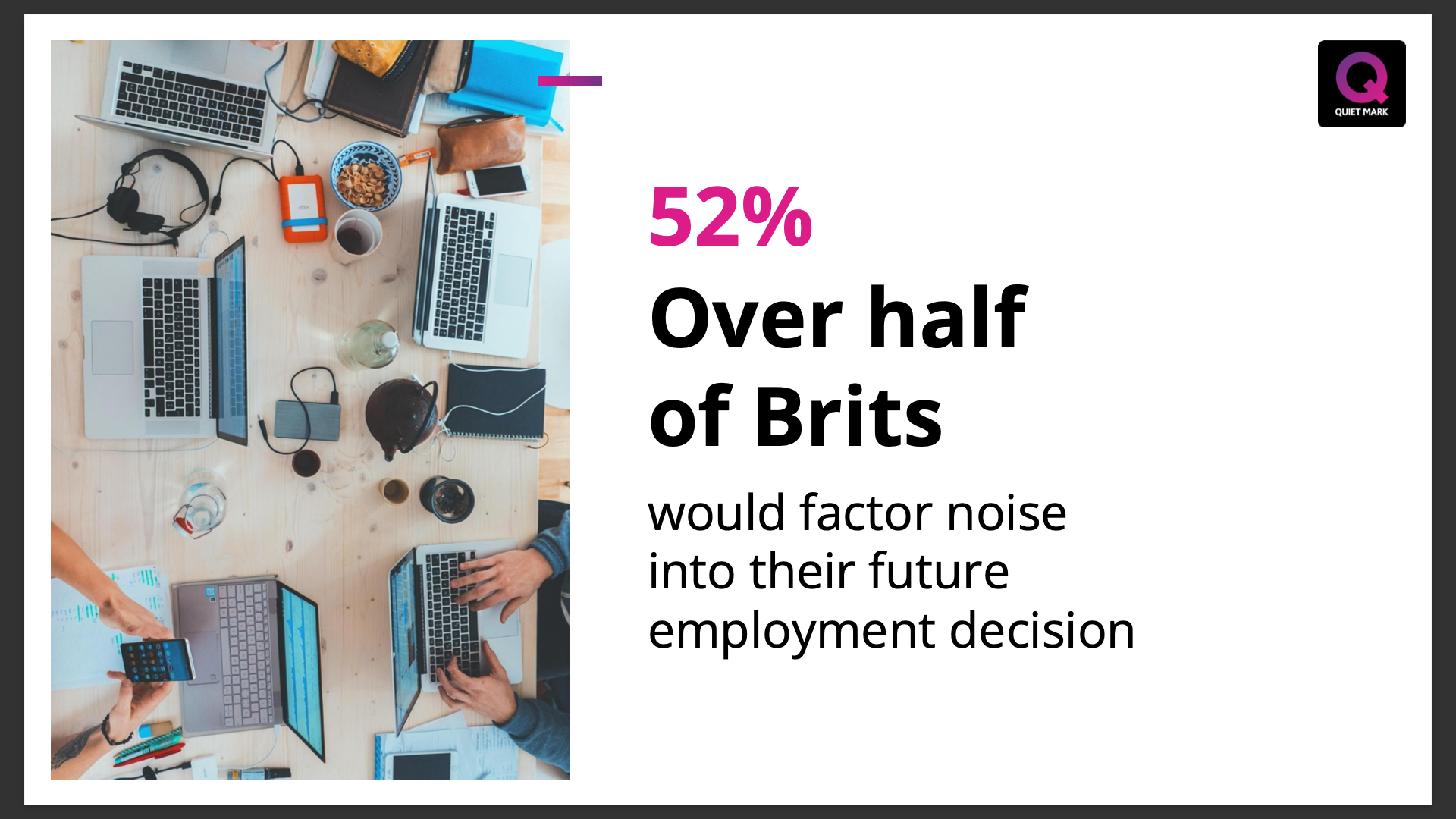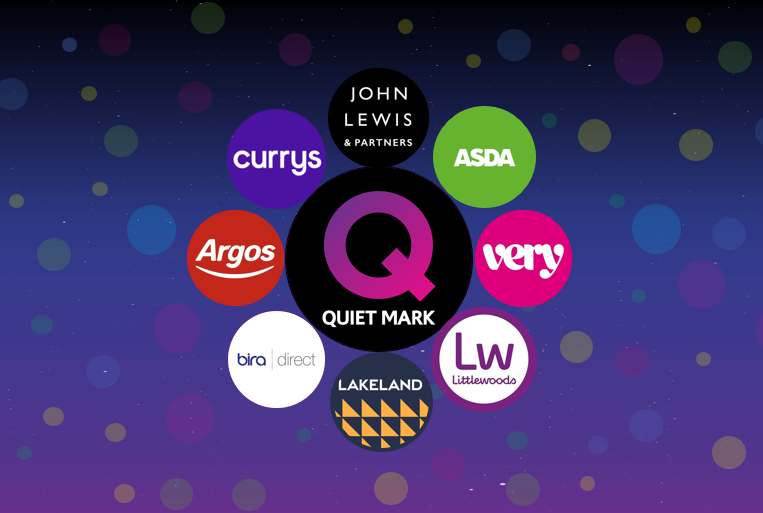Quiet Mark's National Noise Report October 2021:
Household & Workplace Pandemic-Recovery Survey
18 months after the first lockdowns…
Over half of UK adults would now factor noise into their future employment decision
and would also like a quieter home - reveals the new Quiet Mark trends report.

Quiet Mark, the independent global certification programme associated with the UK Noise Abatement Society charitable foundation (est.1959) has conducted a brand new 2021 survey, taking a deep dive into the UK’s attitudes towards noise in their home and work lives, in the wake of both increased work from home and return to the workplace this Autumn.
The latest British home and work trends headlines interestingly show a significant lack of knowledge around how noise importantly impacts on well-being. Other surprise findings are young people aged 18 - 34 having particularly strong preferences for quieter technology:
If Brits were to consider a new job, half (52%) would factor noise into their employment decision. Over a quarter (28%) would prioritise working from home as it is quieter and enables them to concentrate better than in their workplace. On the other hand, just 14% would prioritise working on-site as they find that to be more productive. Over one in ten (12%) would want to work in a different industry or work environment altogether in order to minimise noise.

With kitchens becoming the new wfh office, it’s no wonder over four fifths
(82%) of Brits have appliances within their home that they would like to make less noise
Over half (57%) of Brits would like their home to be quieter, with a further 62% noting that they are drawn towards quieter appliances. This is stronger amongst those aged 18-34 (66%) compared to those aged 55+ (54%). This love for quieter appliances transfers to the cost Brits are willing to pay, with two thirds (63%) of 18-34 year olds willing to pay more for quieter appliances.

The survey, carried out by Opinium Research, sampling 2,000 UK adults aged 18+ across all regions also showed that almost four fifths (79%) of Brits say that it matters how loud an appliance is when purchasing one for their home, with 45% wishing their washing machine, and 43% their vacuum cleaner, were quieter than their current ones.

At 45%, Washing Machines is the product category that most Brits wish they had a quieter model than their existing one.
Through scientific testing and assessment Quiet Mark identifies the quietest products in multiple categories spanning many sectors, including: home appliances and technology, building sector materials and commercial sector products. Only 10% to 20% of the quietest best performing products are awarded Quiet Mark certification.
Each product category is re-evaluated annually to reflect new models coming on to the market. In the past year the number of Quiet Mark certified products listed on quietmark.com has tripled from 350 to over 1,000. The number of manufactures achieving certification has also increased from 60 to over 80, as more household brands join long standing names including Dyson, Samsung and Philips to show responsible achievements in engineering.

Quiet Mark’s Retail Partners, making it easier for millions of customers to source the quietest appliances and technology
Recognising increased consumer demand for quieter appliances, many of the UK’s largest retailers, including Argos, John Lewis & Partners, and VERY, have formed retail partnerships with Quiet Mark. Each has their own Quiet Mark section on their websites, making it easier for their millions of customers to find the quietest technology for all areas of their homes.
John Lewis's technology director, Laurence Mitchell, says there are more than 10,000 searches a month for appliances that include the term "quiet" on the retailer's website, with washing machines and kettles the most likely devices to be linked to the search.
However, the survey did also highlight a lack of knowledge related to the health risks of noise. When it comes to knowledge on hearing, over a third (39%) of Brits incorrectly believe that hearing loss begins at 110 decibels, about the noise level of a rock concert. Just under half (47%) know that exposure to noise can disturb sleep and cause high blood pressure and cardiovascular disease. Only a fifth (19%) know that noise is the second biggest killing natural pollutant after air pollution, according to The World Health Organisation.
“Because sound is invisible it is often overlooked. Yet, the fundamental impact it has on all the physical rhythms of our bodies, our hormones, heart-rate and brain waves is so profound and inherent to our well-being. According to our latest public surveys commissioned by Quiet Mark”, says Poppy Szkiler, CEO & CoFounder of Quiet Mark.
“There is still a huge knowledge gap about this in the UK, which often prevents noise reduction being made a priority in the design focus of new product development, yet unwanted noise is a serious pollutant which affects our brain-waves, heart rate, all our physical rhythms”.
Quiet Mark’s mission is to raise awareness to these health risks, drive quiet design innovation to support public health, and provide solutions to unwanted noise. When people see the distinctive Quiet Mark logo alongside a product, they know it’s one of the quietest products or materials on the market, enabling them to increase the acoustic comfort of their spaces, for greater well-being and improved mental health.
Note to Writers/ Journalists:
The data shared above, and slides in THIS SURVEY DECK share a small selection of highlights from the survey in which 7 questions were asked of the 2,000 respondents across the whole of the UK. Quiet Mark would be willing to provide more granular intel to support a feature, and, should it be of interest, an interview with Quiet Mark’s CEO/ CoFounder, Poppy Szkiler, to discuss the findings further.
Contact Simon Gosling, CMO, on 07717 776852 - simongosling@quietmark.com